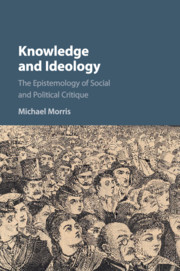Book contents
- Frontmatter
- Dedication
- Contents
- Acknowledgments
- Introduction
- Part I The Dialectic of Ideology
- Part II On Ideology and Violence
- 3 Jean Jacques Rousseau: Economic Oppression, the Gaze of the Other, and the Allure of Naturalized Violence
- 4 Max Stirner: The Bohemian Left and the Violent Self- loathing of the Bourgeoisie
- 5 Marx Contra Stirner: The Parting of Ways
- Part III A Marxist Theory of Knowledge
- Bibliography
- Index
4 - Max Stirner: The Bohemian Left and the Violent Self- loathing of the Bourgeoisie
from Part II - On Ideology and Violence
Published online by Cambridge University Press: 17 November 2016
- Frontmatter
- Dedication
- Contents
- Acknowledgments
- Introduction
- Part I The Dialectic of Ideology
- Part II On Ideology and Violence
- 3 Jean Jacques Rousseau: Economic Oppression, the Gaze of the Other, and the Allure of Naturalized Violence
- 4 Max Stirner: The Bohemian Left and the Violent Self- loathing of the Bourgeoisie
- 5 Marx Contra Stirner: The Parting of Ways
- Part III A Marxist Theory of Knowledge
- Bibliography
- Index
Summary
But the only true voyagers are those who depart,
For the sake of departing …
To plunge into the depths of the abyss, heaven or hell, who cares?
In order to find, at the base of the unknown, something new!
Charles BaudelaireThe German Ideologist Par Excellence
In an oft-neglected portion of The German Ideology, Marx directs 300 pages of vitriolic screed against the man he dubs “Saint Max.” These pages provide little more than Marx's reading notes, frequently interspersed with excerpts from Stirner, and they remain almost incomprehensible for those who have not already encountered and worked through Stirner's principal work, The Ego and Its Own. These pages have been understandably but unfortunately neglected. Amidst much overheated and sprawling polemic, Marx manages to provide some extremely insightful criticisms that remain relevant today. Stirner brilliantly anticipates numerous developments in radical thought, a range of themes later articulated and embraced by Nietzsche, Sartre, Marcuse, Foucault, and Deleuze. Therefore, Marx's critique of Stirner forcefully differentiates traditional Marxism from neighboring strands of radical thought, suggesting lines of critical argument that remain relevant.
In language that led an occasional socialist thinker to celebrate Saint Max as one of their own, Stirner develops a functional conception of ideology, focusing significant attention upon the ways that religion, morality, education, and the state misdirect and diffuse the ultimately superior strength of the proletariat, thereby perpetuating the current distribution of property and the rule of an otherwise timid and ineffectual bourgeoisie. Without direct influence from Rousseau, Stirner reinvents and develops Rousseau's template. He divides society into two broad groups, the weak and the strong, and he considers how various forms of indirect power currently allow the weak to dominate the strong.
However, despite this occasional reliance upon economic language, Stirner ultimately deviates from Rousseau's characterization of the weak and the strong. Thus Stirner identifies “the strong” with those individuals who have the potential to embrace the egoistic, embodied, and radically free nature of the self, those who reject altruism, abstract ideas, the state, customs, and all stable commitments and social roles as inhibiting fetters (Section 4.2). These potentially authentic and free individuals are rare.
- Type
- Chapter
- Information
- Knowledge and IdeologyThe Epistemology of Social and Political Critique, pp. 125 - 160Publisher: Cambridge University PressPrint publication year: 2016

